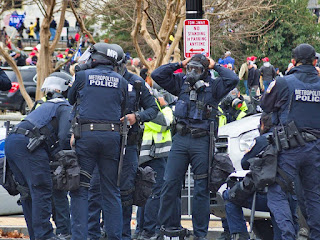The high polarization in our country has created a lot of political anxiety these days. Polls seem to show a toss-up in key battleground states. If one listens to the political ads, our country will be doomed if the candidate you don’t favor prevails.
I would be lying if I said that I’ve been immune to the angst.
Unfortunately, this high tension led to political violence during the last presidential election with four of the rioters dying during the breach of our nation’s Capitol Building. A police officer also died the next day after being injured in the riot. In the days and months following the riot, four police officers who participated in the defense of the U.S. Capitol died by suicide.Part of my current anxiety revolves around whether we can avoid this kind of extremism in this election cycle.
As a person of faith, my prayer is that we can return to a higher discourse in our country. In disagreement, we can solve our differences through deliberation rather than violence. As a person of faith, I also believe that human beings have a responsibility to act in order to bring our prayers to fruition.
John Wesley, Anglican clergyman and originator of Methodism, lived in England in the 18th century. Stakes in British elections were high in 1774 with political tension concerning how to manage the American colonies. There were different sides then as well, and Wesley had some advice for the Methodists of his day that were recorded in his Oct. 6 journal entry.
His first admonition was “To vote, without fee or reward, for the person they judged most worthy.”
This is low-hanging fruit for us to reach, although American politicians do tend to put forth policies that give the appearance of being financially advantageous to voters today.
Wesley’s second piece of advice was “To speak no evil of the person they voted against,” which is a much harder task in today’s climate.
Wesley’s time and culture didn’t feature algorithms designed to feed him news that reinforced all his biases about the other candidate. But it does seem that there was a time not so long ago where we heard the advice growing up, “if you can’t say something nice about someone, don’t say anything at all.”
We could actually shorten debate times quite a bit if we still lived by this. It also might lessen our time on social media scrolls.
Wesley’s third recommendation was “To take care their spirits were not sharpened against those that voted on the other side.” The fact that Wesley had to mention this means that there were many who failed in their sense of unity in his day.
If this seems like an impossibility at this point, it may be that we need to examine how we see our fellow citizens.
If you are already planning on avoiding Thanksgiving with relatives who may have a different political perspective, then polarization has come to roost in your extended family. We often admonish our politicians for not getting more done by working across the aisle. Their inability may flow from us more than we realize.
I would never participate in a Capitol riot no matter how frustrated I became. But do my own attitudes, comments and enmity help to shape an environment where this is possible?
It may be that I need to reexamine and recommit to Wesley’s ideals concerning voting and elections. It would be nice to take an active hand in lessening polarization this year. Maybe my commitment to do so can go hand in hand with my prayer.
This article was originally published in the Tulsa World on October 24, 2024.
Photo taken by Brett Davis and used under the Creative Commons license.

No comments:
Post a Comment